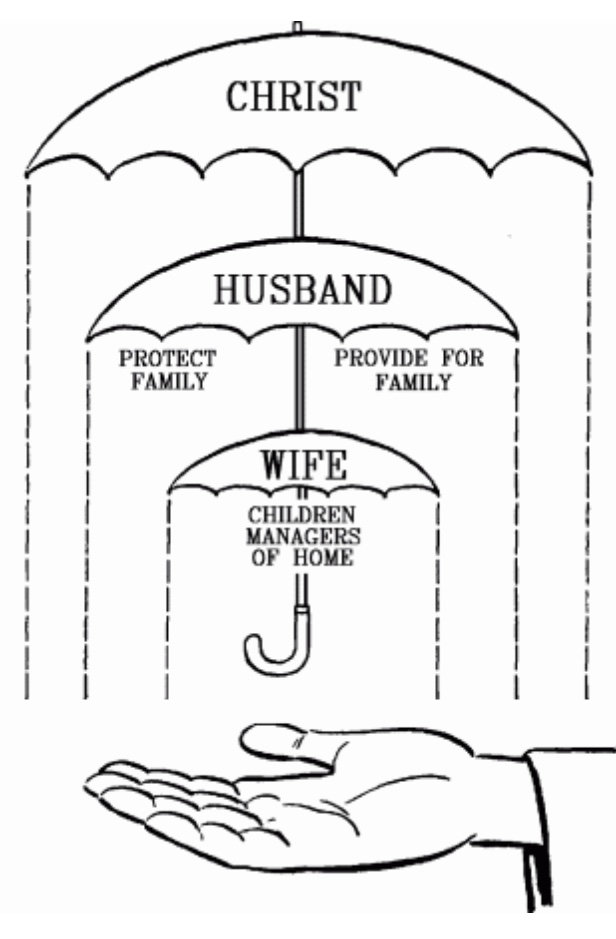“A mother’s virtue has a profound impact on the life of her children. Mothers usually spend far more time with their children than do their fathers and thus have a greater influence. For women to fulfill their calling to raise a godly seed, they must “continue in faith and love and sanctity with self-restraint.” To raise godly children, a woman must be godly herself…. as a general rule, motherhood is the greatest contribution a woman can make to the human race. The pain of childbearing was the punishment for the first sin, but the bearing of children delivers women from the stigma of that sin.”
Excerpt from Divine Design, by John MacArthur

One of the things I most admire about my beautiful wife Natalie is that she is the most self-less person I know. She always puts the needs of those around her ahead of her own needs. She is not impressed with material possessions, she is a diligent worker, she is organized, she is a planner, she is a good steward, and above all those things, she loves her children.
Natalie is a virtuous mother. But she did not become this way through social learning or having a godly mother as a role-model. In fact, it was quite the opposite.
Natalie has this cute little story from when she was in first grade. The teacher had asked all the children what they wanted to be when they grew up. Natalie said that her answer was to be a wife and mother. In the true spirit of feminism, the teacher told her that she needed to pick something else like a job outside the house. Natalie said to me, “I didn’t want to pick anything else, but she made me. So I picked a teacher so I could be with my children.”

I have occasionally asked that same question to a room full of female adolescents in a residential setting. These girls would have piercings, tattoos, dark clothing and dark make-up.
Rather than asking what they wanted to be when they grew up, I asked, “How many of you, when you were little, just wanted to grow up and be a mommy?” Slowly the majority of these hardened girls would raise their hand. There seemed to be a soft sigh of relief when I affirmed their answer.
Perhaps you have heard it said that fathers hold the key to the family. I would add that, while this is true to a large degree, mothers play a much more essential role in the development of healthy and productive children.
In other words, in my clinical experience, I believe fatherless children are, overall, going to be more successful than motherless children—given that the mother is loving, nurturing, and stable.

Just in your own antidotal experiences, you can probably name several successful men and women who lacked a father–figure, but had a strong healthy relationship with their mother. These people, no doubt struggled with the lack of relationship with their earthly fathers, but were resilient in large part due to their strong and close bond with their mothers.
Conversely, the impact of a “bad” mother can have devastating results. During the years I worked in prison counseling, I saw first-hand the destructive results of “bad” mothers. I use the word “bad” in reference to mothers who are cold, distant, selfish, unpredictable, or in anyways detrimental to the growth and development of their children.
My experience can be summed up in a quote from Jay Vernon McGee: “Sometimes a child can recover from a near do well dad, but I’ve never seen one recover from a near do well mother.” Just survey the research and data surrounding the relationship between some of the most notorious serial killers and their relationship with their mother, and you will see the chilling impact of “bad” mothers.

My wife is a survivor of “bad” mothering. I too, believe you can heal from the effects of these destructive forces that seem inescapable.
If you have even a moderately healthy relationship with your mother, then most of what follows will not make much sense. Praise God. You should go and call your mother (if she is still on this earth) and thank her for loving you, for protecting you to the best of her ability, and pass that heritage on to your children.
But if you have a destructive mother then I pray that what follows will shed light on your soul and affirm the notion that, “you are not crazy.” Again, that may sound dramatic to some, but believe me, that is exactly what many of you need to hear.

In the counseling world there are several technical terms that must be dealt with prior to the beginning. This is a very complex and sophisticated problem and will require much attention to detail and a logical progression of observations.

First, we need to acknowledge the sin nature of all men and women. The doctrines of depravity apply here and the only good work that can come from any of us must start with regeneration through the work of the Holy Spirit.
I am writing this under the assumption that the reader is familiar with the Gospel and God’s divine plan for our salvation. From here we must acknowledge that not all those that proclaim the name of Christ are saved. Matthew 7:15-23 says:
“Beware of false prophets, which come to you in sheep’s clothing, but inwardly they are ravening wolves. He shall know them by their fruits. Do men gather grapes of thorns, or figs of thistles? Even so every good tree bringeth forth good fruit; but a corrupt tree bringeth forth evil fruit. A good tree cannot bring forth evil fruit, neither can a corrupt tree bring forth good fruit. Every tree that bringeth not forth good fruit is hewn down, and cast into the fire. Wherefore by their fruits ye shall know them. Not every one that saith unto me, Lord, Lord, shall enter into the kingdom of heaven; but he that doeth the will of my Father which is in heaven. Many will say to me in that day, Lord, Lord, have we not prophesied in thy name? and in thy name have cast out devils? and in thy name done many wonderful works? And then will I profess unto them, I never knew you: depart from me, ye that work iniquity.”

In many cases, mothers simply get a pass for being a mother.
What I mean by that is that most of the time, and rightly so, mothers are revered and held in high esteem because they bear the brunt of childbearing, and in the case of single-mothers, they must work to fulfill the role of the father. Mother’s hold the monumental task of child-rearing and play a vital role in the emotional, physical, and mental development of their children.
Because of these responsibilities, and the fact that most mothers have a desire to want to nurture, to love, and cultivate a safe relationship with their children, mothers have a good reputation in our society for being reliable, protective of their children, and self-sacrificing. But we have to hesitate when we say that “all” mothers have these virtues. Clearly there are some who don’t.

However, when we encounter one, we are shocked and aghast when we hear of a mother drowning her children in a bathtub or participating in their abuse and torture. It is almost unfathomable that a mother would do such things. What makes this even more complicated is when the abusive behavior is covert. To quote Jesus, “wolves in sheep’s clothing.” But let us unpack what Jesus is saying in this scripture.
When we dissect this statement, I come to realize that I am not afraid of wolves in wolves clothing. I can identify them and take the necessary precautions. I am also not afraid of sheep in wolves clothing because while their bark might be big, their bite is weak.
But I am concerned about wolves in sheep’s clothing. They can destroy from the inside. Their meek and false humble demeanor can put them in a favorable position for catastrophic destruction. Think the Trojan horse.

The second most important construct that needs to be identified are methods by which the malice is carried out. Ephesians 6 tells us to: “Put on the whole armour of God, that ye may be able to stand against the wiles of the devil.” (v. 11).
The word “wiles” refers to the clever schemes and manipulations Satan uses to ensnare us through tricks, temptations, or intimidations. These are what the Bible also refers to as “fiery darts” (v. 16).

Let me be very clear at this point. Anyone who participates and engages in these wiles of Satan is engaging in sin. This is not a disease, it is not bad choices, it is not poor coping skills. It is sin.
I say that emphatically because too often we blame the disease as the cause of the problem. Where, more often than not, the disease is the manifestation of the true problem-sin. Again, I want to be very clear that sin is the problem of mankind. Sin is what kills us (Romans 6:23) and separates us from God (Isaiah 59:2).
Now as we move forward, I may use some psychological terms to describe a specifically identified set of behaviors. But these terms are just that.
In fact, the Bible also sets forth and identifies these behaviors and I will rely on scripture as much as possible to convey meaning. However, there will be instances where colloquial psychological jargon will be used to provide clarity to the reader. I will also use specific examples from my wife’s healing process to provide a point of reference.
While she has documented some of her experiences (which you can find here) portions of her story will be told in the hopes that you experience your own healing through the process of identification—which I will discuss the therapeutic value of in upcoming sections.

Let us take a look at how the Bible identifies these malicious behaviors. The Bible tells us in 2 Timothy 3:1-7:
This know also, that in the last days perilous times shall come. For men shall be lovers of their own selves, covetous, boasters, proud, blasphemers, disobedient to parents, unthankful, unholy, without natural affection, trucebreakers, false accusers, incontinent, fierce, despisers of those that are good, traitors, heady, highminded, lovers of pleasures more than lovers of God; having a form of godliness, but denying the power thereof: from such turn away. For of this sort are they which creep into houses, and lead captive silly women laden with sins, led away with divers lusts, Ever learning, and never able to come to the knowledge of the truth.

In his letter to Timothy, Paul identifies many destructive behaviors that Christians can expect. He also gives specific counsel to us on how we are to respond to these destructive relationships—“from such turn away.”
I am going to address this now because it is sure to be a sticking point the moment you try to turn away from such people (especially if it is your mother). You will be accused of “being disobedient to your parents.” I know this was the case in our experience.

We moved away from my wife’s family because of their destructive influence on our family. We had just moved approximately four hours away and out of the first 7 weekends we were gone, her parents came to visit 6 of those weekends. These visits were unannounced, obviously her mother was not getting the message, and we had to set up more clear boundaries (for the emotional safety of my wife and children). As soon as we did, this “obey your parents” card was pulled out by her mother. Her father acknowledged it and reiterated to his wife about how he told her “it was too much.”
Now I am typically not a proponent of haphazardly setting boundaries with people. In order to Biblically establish boundaries with people there needs to be a lot of counsel from godly believers, a lot of prayer, a lot of scripture searching, and an opportunity for restoration. That is, no permanent cutting off.

The problem with setting boundaries without these clauses is that our sinful nature may kick in and may shut out good, godly people who simply want to hold us accountable. For example, I may not like it that a man at my church might tell me to stop working such late hours and that I need to spend more time with my family. My sinful nature may tell me to set a boundary with him, when in actuality, I need to self-evaluate and heed his counsel.

Scripture tells us clearly that we are to “obey our parents,” but what is often left out (by those unfamiliar with the Word of God is the second portion of that scripture that states, “in the Lord: for this is right” (Ephesians 6:1).
As children, we are to obey our parents in the Lord. But when a husband and wife come together as one, he and/or she are then their own authority under God. This transition of authority changes the dynamic in the parent child relationship.
This does not grant the child permission to be disrespectful or to not engage in God honoring behaviors. This must be evaluated on a case by case basis, along with Godly counsel, and held in light of what the scriptures tell us about the will of God in our lives.
We also need to remember that Jesus points out in Matthew 34: “Whosoever therefore shall confess me before men, him will I confess also before my Father which is in heaven. But whosoever shall deny me before men, him will I also deny before my Father which is in heaven. Think not that I am come to send peace on earth: I came not to send peace, but a sword. For I am come to set a man at variance against his father, and the daughter against her mother, and the daughter in law against her mother in law. And a man’s foes shall be they of his own household. He that loveth father or mother more than me is not worthy of me: and he that loveth son or daughter more than me is not worthy of me. And he that taketh not his cross, and followeth after me, is not worthy of me. (v.32-38)

Now it is important to note that Jesus is not saying here that he came to destroy the family unit. But when there are unbelievers, as evidenced by the fruit they produce in their life, even if they are in our family, we are to “turn away” when it creates sin within our family (wife/children) and confess the name of Jesus Christ as Lord of our lives.
Paul highlights the spiritual battle that is taking place: For though we walk in the flesh, we do not war after the flesh: (For the weapons of our warfare are not carnal, but mighty through God to the pulling down of strong holds;) Casting down imaginations, and every high thing that exalteth itself against the knowledge of God, and bringing into captivity every thought to the obedience of Christ; And having in a readiness to revenge all disobedience, when your obedience is fulfilled. (2 Corinthians 10:3-6).
That “readiness to revenge all disobedience” gives us permission to set boundaries with the ungodly.

If you are like us, you will be accused of being disrespectful in your actions to create distance and separation from the ungodly. After all, didn’t you just say in the last paragraph that children are not to be disrespectful to their parents?
The key to having a Biblical understanding in this scenario rests in the hearts and motivations of the opposing party. Again, this may require godly counsel from an outside perspective.
In our particular situation the ongoing, destructive influences (alcoholism and verbal and physical abuse) was and is not cultivating a godly environment for my wife or my children.
While my prayer and hope has always been restoration with my wife’s family, our simple request to refrain from exhibiting these destructive behaviors in our presence was met with, “If we can’t do what we want, or say what we want to the kids, then we don’t want to have anything to do with you.”
As a protective father and shepherd of my family, I cannot in good conscious allow anything into my family that undermines my God assigned role and leave my wife and children exposed and vulnerable. The door is always open for restoration, but not at the expense of lowering the standard God has called us to follow.
From a psychological perspective, this is basic systems theory. The dysfunctional family functions quite well in their dysfunction. Any upheaval or coming against the system will be met with opposition because the dysfunctional system has established homeostasis. I say all of this to help prepare you for the road ahead. Expect it. But remember God has set you apart and He will not lead you where His will not protect you.
I would like to remind the reader that we have been talking about destructive forces within the family unit—namely the role of bad mothering.
We are not talking about backslidden Christian families who are not getting along. We are talking about malicious, covert, “wolves in sheep’s clothing.” We are talking about pervasive, unrepentant sinners that are seeking to do the will of their father the devil.
This language may seem harsh, but if you recognize what the devil came to do in John 10:10 (“to steal, and to kill, and to destroy”) then you can identify the difference between Christ’s loving patience with sinners, and His total rebuke of the pharisees’ hypocrisy.

While God gives us a list of malicious behaviors in 2 Timothy 3:1-7 (see above scripture). The secular world also describes many of these same behaviors. What the Bible attributes to the will of Satan, the secular world identifies as manipulation.
If you were to ask a counselor or therapist who or what are some of the most challenging obstacles they encounter in the clinical setting, the conversation would quickly transition to personality disorders.
While mood disorders (bi-polar depression, major depression, etc.) and mental disorders (schizophrenia, anxiety and eating disorders, etc.) are challenging in their own right, personality disorders offer a level of complexity that is unmatched in the clinical setting. This is in part due to the fact that they are what we identify as pervasive. That is, they are so “fixed” into a client’s inner experience and behavior that simply talking about the “problem” is the problem.

To help illustrate this I would like to share two distinct memories I have of my graduate school internship. I cut my teeth on personality disorders when I was asked to run a weekly anger management group.
If you have ever run or attended an anger management group you can quickly come to appreciate that this is where some of the personality disorders will find themselves. While not all of them will show up here (which I will follow up on this point a little later), two of the major personality disorders will no doubt be in attendance every week.
The first one is the anti-social personality disorder. These clients are typically mandated to attend this sort of group either by a judge or a court order. They have no idea why they have been asked to complete anger management since they do not think they have anger issues. Their objective in attending is typically to acquire a signature from the therapist to present to the court as proof of attendance.
I remember asking one of the group members why he was attending my anger management group. He claimed that the court had sentenced him to treatment for an anger problem he did not have. I realized that I had not asked the right question. The question I should have asked was, “What does the court say you did that required you to attend my anger management group?” See the difference? Any socially adjusted person would know the spirit of my question and be able to answer accordingly. The antisocial personality client was engaged in this “fixed” or “concrete” mode of thinking where he could not and would not take responsibility for his actions.
So back to my question. The client explained that he had been driving his car and another driver had offended him in some way (e.g. not using a turn signal, cutting him off, obscene hand gesture, etc.), and he proceeded to follow the other driver. He said that he followed him to his house and they got into an altercation at the other driver’s home on the front lawn. Clinical judgement told me to keep asking questions. So I asked where the driving incident occurred. The client said that it occurred close to the Missouri/Iowa border. I then asked where this other driver lived. He said, “Des Moines.” I will save you from getting out your map, but that is approximately a two-and-a-half-hour drive! I don’t know about you, but after two-and-a-half-hours on the road, and I’ve already stopped twice and forgot what I had for breakfast.

The second personality disorder that I met in my anger management group was the borderline personality disorder. While delving into the mind of a person with borderline personality is beyond the scope of this entry, suffice it to say that borderline personality disorders are the most commonly dreaded personality disorders in all of therapy.
I have sat through countless trainings and when the words “borderline personality disorder” is mentioned, there is a collective sigh and moaning that is emitted from the audience of therapists. And for good reason.
In the middle of one of my first anger management sessions, a female client with borderline personality disorder began telling a story of how her day was going. She proceeded to inform the group that she had a 357 magnum in her purse and that she had already brandished it that morning to someone who had crossed her in her neighborhood. It was at this point that I began asking myself, “And you paid how much for graduate school? So you could do what?”
As mentioned before, the clinical challenges of the personality disorders are the nature of the disorders themselves. Imagine using traditional therapeutic techniques with someone like Mr. Anti-social. How would he respond to “Do you think it was ok to drive two and a half hours to beat someone up on their front lawn?” Or to Ms. 357; how comfortable would I be to challenge her with something like, “I don’t really think you are taking responsibility for your actions,” knowing good and well that she could easily alleviate my student debt with one little reach for her purse.
Therapy becomes extremely difficult when you have to establish that the client has problems before you can start working toward solutions. I mentioned earlier that not all personality disorders manifest themselves in the therapy setting. This is because many, if not all, of the personality disorders are so ingrained into the person’s inner experiences and behaviors that they cannot and will not recognize the impact they have on those around them. If they do recognize the impact they have, their lack of empathy prevents them from making the necessary changes. Unfortunately, the wake of destruction they leave in the lives of their family and friends is what makes its appearance in therapy. It is the wives, husbands, and children who suffer the real consequences and are the victims. The simple act of validating the experiences of these victims is one of the most therapeutic techniques a therapist can embrace. I have heard comments like: “Finally, someone understands me,” or “I’m not crazy after all,” or “You are the first person who has ever believed me.”
I want to shift the focus onto a personality disorder that, to me, is even more complex and threatening than antisocial or borderline personality disorder: narcissistic personality disorder. This disorder has been given relatively little attention when compared to the other personality disorders. Most of the time narcissistic personality disorder is presented in a humorous and nondescript manner. The term narcissistic comes from Greek mythology. Accordingly, Narcissus was a beautiful hunter who ultimately fell in love with his reflection and became stuck and unable to leave his reflection. He eventually came to the realization that his love could not be reciprocated and the passion within him burn so intensely that he was transformed into a gold and white flower.
Like oral fixations and calling someone anally retentive (or just “anal”), when describing their whimsical neurotic behavior, calling someone a narcissist does not encapsulate the vulgar and obscene nature of the word. I believe if the majority of Christians knew the etymology of these words they would think twice or come under conviction for uttering them to describe anything but the manifestation of these behaviors in a seriously troubled person’s life. While I am not trying to start a debate about which personality disorder is the worst, I do want to make sure that we do not gloss over the destructive nature of the narcissist. This disorder leaves its victims in a perpetual state of emotional abuse, isolation, and shame. Often the victims are not even aware that they are victims or that they are being abuse by the narcissist. Thus, prolonging the abuse and the desire for the victims to seek help. These victims can recognize that something is wrong but, most of the time they blame themselves and pass it off as “just the way it is.”
Narcissists, like some of the other personality disorders, do not typically enter into therapy. Similar to the antisocial personality disorder, narcissists do not see that they have a problem. They have a grandiose sense of self-importance. A defining hallmark of a person with narcissistic personality disorder is that they refuse to be seen in an unfavorable light. This is different than the antisocial in that the narcissist will manipulate in a subtle and covert manner. In a social setting, the antisocial will leave the room cussing and violently defending his position, giving little care to whether or not you accept and like him. But the narcissist does care about how they are perceived. They will manipulate the room by engaging in a highly sophisticated and elaborately planned out execution of what I call “impression management.” Like the antisocial, the narcissist lack empathy and sees no need to seek therapy for their symptomology.
I would like to take just a brief moment to discuss the ebb and flow of counseling therapy and treatment. Have you ever noticed that diagnoses are en vogue? About every 10 years or so a mental diagnosis will dominate the spotlight. For a while Bi-Polar disorder consumed the headlines. During the 1990s and the early 2000s children were frequently diagnosed with Attention Deficit Hyperactivity Disorder. Now it is commonplace to hear about Autism and Reactive Attachment Disorder. The reason I bring this up is because treatment is also en vogue. Any introductory psychology class will have your head reeling from Freud’s psychoanalysis to Skinner’s behavioralism to Beck’s cognitive therapy. But which treatment is the best? Which treatment works? The answer is that it depends. Typically, the treatments with the most research and the ones that are embraced and compensated by insurance providers are viewed in the clinical setting as the “best treatment practices.” Over the years these approaches have changed right along with the problems that they are chasing. In the past, some women sought treatment for hysteria and underwent a medical procedure called a hysterectomy to physically remove the source of the problem. Lobotomies and electroshock treatments were used to remove and deaden parts of the brain that contained bad memories that were the source for depression. Current trends in treatment seek to use medication and talk-therapy to specifically target a client’s problems. From biofeedback monitors to weighted blankets and fidget spinners, treatment evolves (or devolves) right along with the diagnoses they chase. I say all of this to highlight that the lack of awareness the public has when it comes to narcissistic personality disorder is due in large part to the covert nature of the disorder itself. Narcissists are not coming into therapy and saying “Hey, I am having a problem with having good thoughts of myself. In fact, I think I am always right, and I would like to think I am wrong sometimes.” Pharmaceutical and mental health centers are not targeting the narcissistic population the same way they do depression or anxiety. Whereas they might print up a brochure or put together a commercial that can openly target the symptoms of anxiety and depression, can you imagine how they would target a narcissist? I imagine it would go something like this:

“Do you have trouble thinking too highly of yourself? Are you tired of manipulating your way through life? Do you ever wish you could be second best? If so, our professionals can help you. We can help you realize that you are really like all the rest of us, and that you are not special in the way that you think you are special. Our trained staff can help you spot your imperfections and feel average. We can also improve your vocabulary to include words and phrases like: ‘I’m sorry. That was my fault. I am working on being a better person. And, you were right.’ Our clinical services may also be able to help. If you are having thoughts of superiority, inflated self-worth, or you are just exhausted from manipulating others and being the victim in every given situation, then ask your doctor if Humilify is right for you. Side-effects may include healthy relationships, an accurate view of self, and meaningful connections with the world around you.”

Okay, I may have enjoyed that last absurdism a little too much, but hopefully you get the idea. Narcissists fly under the radar because of the covert nature of the disorder. The narcissist does not present him/herself in therapy because they simply do not think they have a problem. And many times, the true victims of the narcissist do not seek the help they need because they have been trained to never question the authority of the narcissist. A sort of learned helplessness is created because often times the narcissist is the accepted authority in each relationship. Come against this authority and you will be quickly put back in your place. This form of psychological abuse if often hidden, untreated, and unfortunately accepted by the victim.
I mentioned a little earlier that one of the most powerful therapeutic techniques that can be employed is the affirmation that the victim is just that, a victim of abuse. Victims of this sort of abuse begin to heal when they realize two things. First, they realize that they are not the source of the problems, and secondly that they can heal without the consent of the narcissist. This goes without saying, but I will cover it just in case a narcissist is reading this and looking for someplace to shift the responsibility. Being a victim is a real thing, and is the result of being exploited or having your rights violated whether it be physical, sexual, or emotional. You can be a victim from neglect, and you can be a victim through provocation. However, being a victim does not give you permission to take the victim stance. Being a victim gives you permission to identify as a victim, and then start the healing process. Manipulating others through taking the victim stance is wrong and puts you in the same category as the narcissist, the antisocial, and the borderline. Despite your background and your experiences, taking the victim stance is almost always a vice—regardless of who you are or what has been done to you.
Where Do I start?
Bad mothering can present itself in many different forms. Some victims can easily identify the problem. For example, a child whose mother is physically abusive or is engaged in substance abuse, prostitution, or criminal activity will more than likely leave a trail of destruction (e.g. bruises, prison stents, legal complications, etc.). But some victims are left confused, even questioning their own experiences. This is because the mother has developed a highly attuned set of manipulation skills. I have compiled a list of abusive behaviors that will hopefully be a good starting point for further exploration. Since we are talking about mothers, I will use the female pronoun. Men too can engage in these behaviors, but the effects in the victim are different. In men, the narcissistic personality disorder is often times overlooked and mislabeled simply because of the socially recognized male gender roles. What might appear to be braggadocios, self-centered, “alpha-male,” cocky, charismatic behavior can actually be narcissistic personality disorder in disguise. This list was compiled for those who are seeking clarification about their experiences with their mother.

Everything she does is deniable
She is envious
She minimizes and ignores your opinions and expressions
Self manipulations are paraded as gifts
She maintains a lifetime campaign of control
Abuse is rationalized
Highly inflated view of herself
She must be in the superior position
She lets you know often that you are inferior and blames you for everything that goes wrong
She maintains a false self to manage her image
She must win
She will use her children and get them to do her bidding
She steals her child’s future relationships
She exploits others
She is the rule maker and the exception to those rules
You find it extremely difficult to describe what is so bad about her
Your property is given away without your consent, and in turn you are blamed for being selfish
You find it dangerous to say mother is wrong, so you find it safer to agree with her stance on you being the bad child
She mentally and emotionally exhausts her child
She goes through your things regularly (e.g. trash, mail, email, etc.)
She does things directly against your expressed wishes
She demeans, criticizes, and denigrates
She slips in little comments about how she enjoys time with other people
She undermines your accomplishments unless it makes her look good
She makes it clear that she does not listen to a word you say
She can not handle the word “no”
She is careful who she tells what lies to
She manipulates your emotions in order to feed on your pain
Any challenges will result in her exploiting you
She terrorizes and uses fear to train and control you
She will never risk exposure
She is careful about her deniability
She is unwilling to acknowledge pertinent facts
She will character assassinate you to make you look like the fool
She will say whatever feeds her purpose for the moment without regard for the truth
No empathy, callous, dismissive
When you try to have a conversation in resolving conflicts with her, she turns the conversation around on how awful you are (another form of deflecting)
She creates communication shut down, she wants uncomfortable silence, and punishes with the silent treatment
She ridicules, is condescending, and mocks what you say, has caustic comments, neutralizes anything you say with sarcasm and haughtiness
She uses confusing questions and comments (gaslighting) so it will create doubt in who you really are
She believes her drama and problems deserve your immediate attention
Her least whim takes precedence over your basic needs
She tells you how unappreciative you are for her sacrifices
She tells you how hard she has had it
She tells you all the great things she has done for you and other people
Her gifts have strings
She buys her friendships, affections, and loyalty
Her aggressive and hostile acts are paraded as thoughtfulness
She lets you know that you are no good without her saying a word
She violates your boundaries
She uses minimizing statements, such as “This is ridiculous.” or “You don’t know what you are talking about.”
She invalidates what you are, what you say, and who you are
She makes you look like you are the crazy one by claiming, “You have a vivid imagination” or “That’s not how I remember it.”
She damages children’s relationships with brothers, sisters, and amongst siblings
She projects her bad character traits on you so she can deny them in herself, and in turn punishes you
She engages in crazy-making and “gaslighting”
She favorizes one child over the other (splitting)
You are discussed in your presence as though you were not there
Her criticism and slander are disguised as concern
She lies and creates conflict, especially among family relations
You are an extension of her and you are there to make her look good
She stores up her rage and saves it for a later date until she can use it for a later time. This gives her time to create a narrative that is “air-tight”
She is insanely defensive and sensitive to criticism
She coyly disguises her ideas of how inadequate you are
Whatever feeds her purpose for the moment without regard for the truth
She must discount you and convince others that she does not lie
Your pain is her entertainment

Our prayer at Hope for the Home Ministry is to provide encouragement for those suffering from the effects of “bad” mothering. We want you to know that there is healing that can take place in your life. While the answer is always Jesus, your healing will look different than someone suffering from self-imposed behaviors (e.g. addiction, financial problems, making poor choices, etc.). I know this is a lot of information and can be really scary. It is common to have second-thoughts, doubts, feelings of betrayal and disloyalty. However, Jesus says in John 10:10 “The thief comes only to steal and kill and destroy. I came that they may have life and have it abundantly.” God is looking to use his children to bring Glory to His name. The devil knows that. He cannot take your salvation, nor your life, but he can have power to influence your testimony through his lies and deceit. We believe that God is calling you out into the Light so that it may shine before men (Matthew 5:16). My wife can attest to every one of these apprehensions, but if you are like her, you were probably programmed from a very young age. While we have made our fair share of mistakes along the way, God has been gracious and merciful to our family. Our desire is for healing, restoration, peace, and Jesus is in the business of redemption. I have seen God heal some terrible hurts in Natalie’s life. We do serve a Living Savior, and never underestimate what God can do for His glory that the devil first intended for your destruction. Love wins every time.